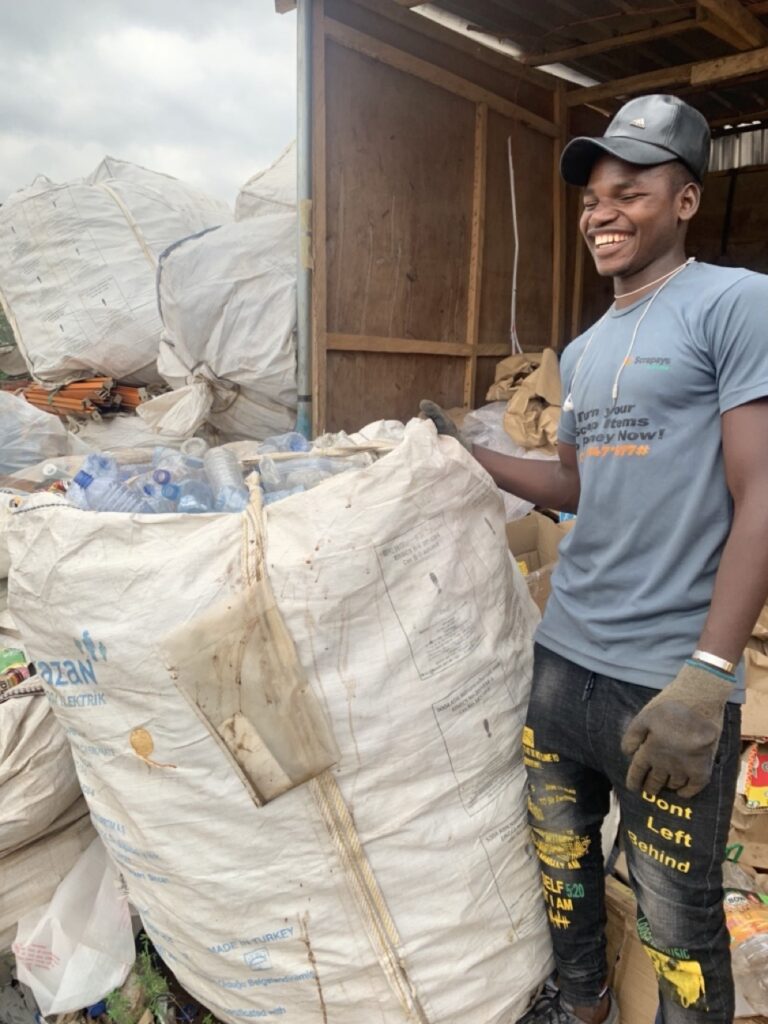By Joshua Ebinabo War & Wairimu Gitahi
Nigeria faces a waste disposal problem, with an estimated 32 million tonnes of solid waste produced annually. The lack of proper waste management leads to environmental pollution, sewage issues, and health risks. However, the disposal challenge also presents an opportunity for waste management companies to scale their operations, creating job opportunities and improved livelihoods.
Scrapays is a digital platform that leverages technology and a distributed agent network to create an improved recycling value chain. “We’re able to work with waste producers to dispose of recyclable materials correctly and ensure that we get them to manufacturers who require the materials for production. This ensures that the waste is not diverted to landfills. In addition, we’re able to help individuals start up recycling businesses, scale them, and create new jobs,” says Tope Sulaimon, Co-founder, Scrapays.
Scrapays’ online and offline channels allow waste producers (individuals, SMEs, and enterprises) to request pickup of their recyclable waste via USSD shortcode or WhatsApp Bot (Temi from Scrapays). The solution allows aggregators (Collectors & Agents), predominantly young, middle-low-income Nigerians to secure work. They do this by leveraging not only the app, but also Scrapays logistics support and IoT-enabled scales for efficient business operations, including a detailed inventory of stock and transactions. The agents use smart scales to weigh and get the monetary value of the waste collected and pay the waste producers accordingly.

The collected waste is stored at agent locations for a temporary period until the required volume is reached. These agents serve as intermediaries between manufacturing companies and waste producers. Scrapays logistics partners are deployed to aggregate across multiple agent locations and pass the waste on to manufacturers who purchase the waste. The payment the agents receive covers the purchase cost from collectors and or waste producers, plus the commission on every kilogram of waste collected. This agent model holds significant potential for creating employment. With over 1,600 registered agents on the platform, Scrapays aims to increase this number to about 21,000 active agents in the next 9 months, serving over 650,000 waste producers together. The model is already improving livelihoods: “One of our best-performing agents is also a collector, and she grew from earning about $80 a month to earning $3,350 a month after ten months of consistent activity recovering 14 tons of material in this period. This is a very good example, and we’re extremely proud of what we’ve helped this person do and what we’ll continue to do with agents and collectors,” says Tope.
Tope compares collectors to Uber drivers and describes the location where recyclable materials are taken as an Airbnb for recyclables, “Just like Uber drivers, the collectors receive a pick-up request by the producers to collect waste, which they take to an agent location, so we refer to this location as an Airbnb for recyclables because you’re letting your space off to store recyclable materials and getting paid for letting your space,” he says.
The Jobtech Alliance Innovation Lab has partnered with Scrapays to explore how agency-based models can generate livelihood opportunities across diverse sectors. Furthermore, we will work together to identify and capitalize on opportunities for creating environmentally sustainable green jobs. The Jobtech Alliance Innovation Lab supports startups in multiple areas, including job creation and commercial growth strategy. Through our collaboration with these startups, we develop a structured learning agenda that benefits the individual companies and the broader Jobtech ecosystem. “In a fragmented business environment, exploring avenues for generating more jobs becomes crucial. This collaboration holds great significance in this context. By working together, we aim to identify and capitalize on opportunities that will create additional employment opportunities,” says Joshua Ebinabo, Venture Builder, Jobtech Alliance.
The Scrapays platform enables the entire ecosystem of waste collection via features like e-wallet transfers, collector and agent mapping, and account float. Together, the solution simplify payments and tracking for waste producers, collectors, agents, and logistics partners. It also links the players together to create accountability; “The logistic partners and the processors get paid when Scrapays gets paid, after materials have been delivered to the manufacturers. So, it’s a revenue sharing model where everybody in our value chain gets a part of the value from recycling the materials, including Scrapays,” adds Tope.
Scrapays launched its agent model in January of 2022 and currently operates in three states in Nigeria: Lagos, Ogun, and Ondo. Over the next nine months, they plan to reach 22 states within Nigeria and explore opportunities to expand into five other African countries within the next 18 months. They are also considering expansion into Southeast Asia and Latin America, aiming to broaden their reach and impact.
___________________________________________________________________________________________________________________
The Jobtech Alliance is an ecosystem-building initiative around inclusive jobtech in Africa launched in late 2021. We’re interested in digital platforms which connect people to work opportunities that build livelihoods – this includes gigmatching platforms, jobmatching, e-commerce marketplaces, and more. The Jobtech Alliance helps jobtech platforms to grow and create more jobs.

0 Comments